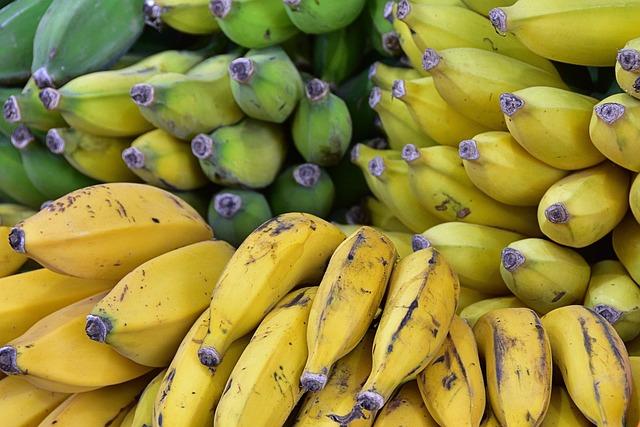Westfalia Fruit’s Chilean Alliance wins Prestigious UN Enduring Development Award
In a remarkable achievement, Westfalia Fruit, a leading global supplier of avocados and othre fresh produce, has been recognized with a prestigious United Nations Sustainable Development Award for its innovative partnership in Chile.this accolade highlights the company’s commitment to sustainable agricultural practices and its efforts to foster economic development while addressing pressing environmental challenges. By collaborating with local growers and integrating sustainable techniques into their operations, Westfalia Fruit is setting a benchmark for corporate responsibility within the food industry. As global attention increasingly turns toward sustainable practices, this recognition underscores the vital role that strategic alliances can play in achieving the UN’s Sustainable Development Goals (SDGs) and promoting a greener future for food production.
Westfalia Fruit’s Strategic Partnership in Chile: A Model for Sustainable agriculture
westfalia Fruit’s collaboration with local growers in Chile has been recognized for its remarkable commitment to sustainable agriculture, earning accolades from the United Nations. This partnership emphasizes sustainable practices, focusing on environmental health, social equity, and economic viability. The initiative has seen meaningful improvements in agricultural methodologies, reducing pesticide usage, and promoting organic farming principles. Noteworthy elements of this alliance include:
- Water Conservation: Implementation of advanced irrigation techniques to optimize water usage.
- Soil Health: Utilization of organic fertilizers and crop rotation to enhance soil quality.
- Local Empowerment: Training programs for local farmers aimed at improving yields and sustainability.
The measurable impact of this alliance is evident in both the quality of the fruit produced and the welfare of the farming communities involved. By fostering a model that integrates innovative practices while uplifting local economies, Westfalia Fruit sets a precedent for future agricultural partnerships globally. A comparison of yield enhancement over the years highlights the effectiveness of this sustainable approach:
| Year | Yield (tons per hectare) | water usage (liters) |
|---|---|---|
| 2020 | 9.5 | 12,000 |
| 2021 | 10.8 | 10,500 |
| 2022 | 12.2 | 9,000 |
Impact of the UN Sustainable development Award on Global Supply Chains
The recent recognition of Westfalia Fruit’s partnership in Chile, which clinched the prestigious UN Sustainable Development Award, signifies a pivotal shift in the global supply chain landscape. This award serves not only as an acknowledgment of sustainability efforts but also as a catalyst for other businesses to adopt environmentally responsible practices. The enhanced visibility and credibility associated with such accolades can significantly influence market dynamics, prompting suppliers and retailers alike to reassess their sourcing strategies. Companies are increasingly aware that sustainability is not merely a compliance issue but a crucial driver of competitive advantage in today’s environmentally conscious market.
This accolade also underscores the importance of collaboration among stakeholders in the supply chain, highlighting how strategic alliances can lead to innovative solutions for sustainability challenges. By fostering partnerships that emphasize responsible sourcing, resource efficiency, and ethical labor practices, businesses can streamline their operations while positively impacting the environment. As organizations strive to meet the UN’s Sustainable Development Goals, we can expect to see a ripple effect throughout various sectors, fundamentally reshaping supply chains around the world. Below are key factors influencing this conversion:
- Increased transparency in sourcing practices.
- Greater consumer demand for sustainable products.
- Regulatory pressures encouraging compliance with sustainability metrics.
- Collaboration opportunities for sharing best practices and resources.
Scaling Success: Key Recommendations for Future Alliances in Sustainable Practices
Considering Westfalia Fruit’s recent recognition from the UN for its innovative alliance in Chile, businesses are encouraged to foster partnerships that prioritize sustainable practices. Achieving sustainability requires collaboration across sectors, allowing stakeholders to leverage shared resources and expertise. Companies should consider integrating the following strategies into their future partnerships:
- Co-Creation: Involve local communities in the development of sustainable practices, ensuring that solutions meet their unique needs.
- Transparency: Build trust through open communication about environmental impact, resource usage, and progress towards targets.
- Knowledge Sharing: Facilitate workshops and training sessions to disseminate best practices and innovative solutions.
To maximize the impact of these alliances, it is crucial for organizations to establish clear objectives, measure performance regularly, and adapt strategies based on feedback. A focus on collaborative metrics can guide the evaluation process:
| metric | Description |
|---|---|
| Resource Efficiency | Measure reduction in water and energy usage across the supply chain. |
| Community engagement | Track the number of initiatives involving local participants and businesses. |
| Carbon Footprint | Assess overall greenhouse gas emissions associated with partnered projects. |
the Way Forward
Westfalia Fruit’s successful partnership with Chile has not only fortified its position within the global supply chain but has also set a benchmark for sustainable agricultural practices. The recognition from the united Nations is a testament to their commitment to environmental stewardship, community engagement, and innovation in avocado production. as the demand for sustainable food sources continues to grow, this alliance serves as an inspiring model for other companies looking to align profitability with responsibility. With its sights set on expanding these efforts, Westfalia Fruit is poised to lead the way towards a more sustainable future in the agri-food sector. As industries worldwide grapple with the challenges of climate change and resource scarcity, initiatives like this one underscore the critical role of collaboration in achieving the UN’s Sustainable Development Goals.


